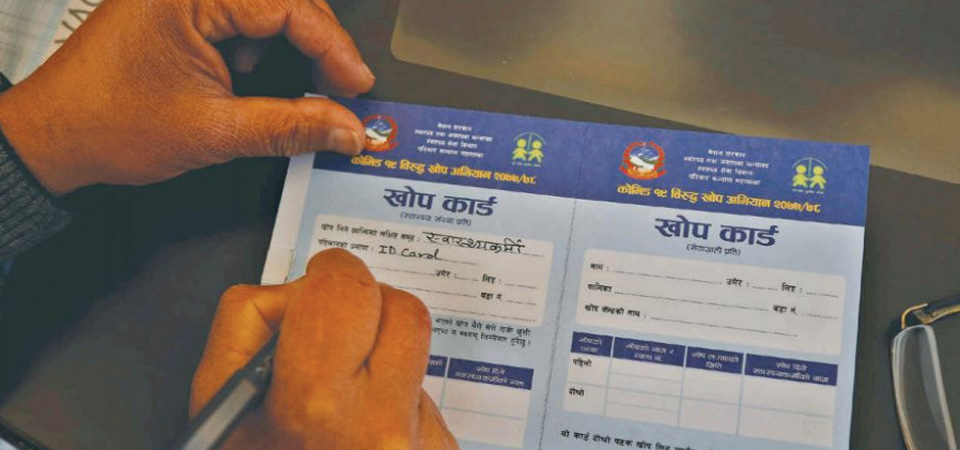Provision of immunisation card affects service recipients

By A Staff Reporter
Kathmandu, Feb. 2: The Ministry of Home Affairs has made it mandatory to produce vaccination certificates, or a photo of it, to enter public facilities and access government services in response to the rising cases of coronavirus.
The decision of limiting the use of public amenities and avail government services to those who have been vaccinated has encouraged more people to get jabbed.
According to the Ministry of Health and Population, as of Tuesday, 14,407,775 people, or 47.7 per cent of the total population, have been fully vaccinated, while 16,830,395 or 55.5 per cent have received at least one dose.
The government data confirms that not all people have access to the vaccine and in such a condition making vaccination cards mandatory for travelling and receiving public amenities has affected many.
Thousands of women, adolescent girls and people from the underprivileged community have been deprived of immunisation services in lack of access to information, others are unable to receive jabs in lack of identity cards to prove their nationality.
The provision has made violence-affected women and adolescent girls more vulnerable and their access to justice has been hampered.
According to Women’s Rehabilitation Centre (WOREC), a non-governmental organisation working for women rights and social justice, following the decision of the government many such cases were reported across the country.
On January 23, a domestic violence affected woman of Siraha, went to the Land Revenue Office with a court order freezing the land which she had claim over. But she was denied entry because she did not have her vaccination card. Frustrated, she called WOREC. After many requests she was allowed but was worried as to what she would do in the future.
Sanyogita Shah, a human rights defender of WOREC, Dhanusa received a phone call on January 23, where a victim of domestic violence was complaining that she was not allowed to meet the Superintendent of Police because she didn’t have a vaccination card.
She was reportedly deprived of vaccine because she does not have a citizenship certificate or marriage registration.
Citizenship certificate or any other identification certificate issued by the government is a prerequisite to get the COVID-19 vaccine.
Similarly, on January 26, ward member of Laxminiya Municipality of Janakpur took a violence victim to the District Police Office to help her to get justice. But the victim was not allowed to enter inside the office because she did not have vaccination certificate.
These are only few representative cases. The provision of mandatory vaccination card has affected the violence affected women and marginalised communities, said Executive Director of WOREC, Lubharaj Neupane.
“It is the human right of every citizen to have equal access to the services provided by the state. For this, a special arrangement should be made for the people without citizenship and identity card and wide dissemination of information related to immunization services for women and adolescents and marginalised communities,” he said.
However, Home Ministry officials said that no one was barred from getting vaccines for not producing citizenship certificates.
Talking to The Rising Nepal, Fadindra Mani Pokharel, Joint-Secretary and Spokesperson of the Home Ministry, said the government had not barred anyone from getting vaccines only because they don’t have citizenship certificates.
“Even the foreigners and refugees are also receiving the vaccines in Nepal. To get the jabs, one has to show any forms of identity card. For those, who don’t have any identity card, they can get jabs on the recommendation of the ward,” said Pokharel.
The issue of citizenship is different. However, the ministry is ready to facilitate if such incidents come to their notice, he said.
Recent News

Do not make expressions casting dout on election: EC
14 Apr, 2022
CM Bhatta says may New Year 2079 BS inspire positive thinking
14 Apr, 2022
Three new cases, 44 recoveries in 24 hours
14 Apr, 2022
689 climbers of 84 teams so far acquire permits for climbing various peaks this spring season
14 Apr, 2022
How the rising cost of living crisis is impacting Nepal
14 Apr, 2022
US military confirms an interstellar meteor collided with Earth
14 Apr, 2022
Valneva Covid vaccine approved for use in UK
14 Apr, 2022
Chair Prachanda highlights need of unity among Maoist, Communist forces
14 Apr, 2022
Ranbir Kapoor and Alia Bhatt: Bollywood toasts star couple on wedding
14 Apr, 2022
President Bhandari confers decorations (Photo Feature)
14 Apr, 2022











